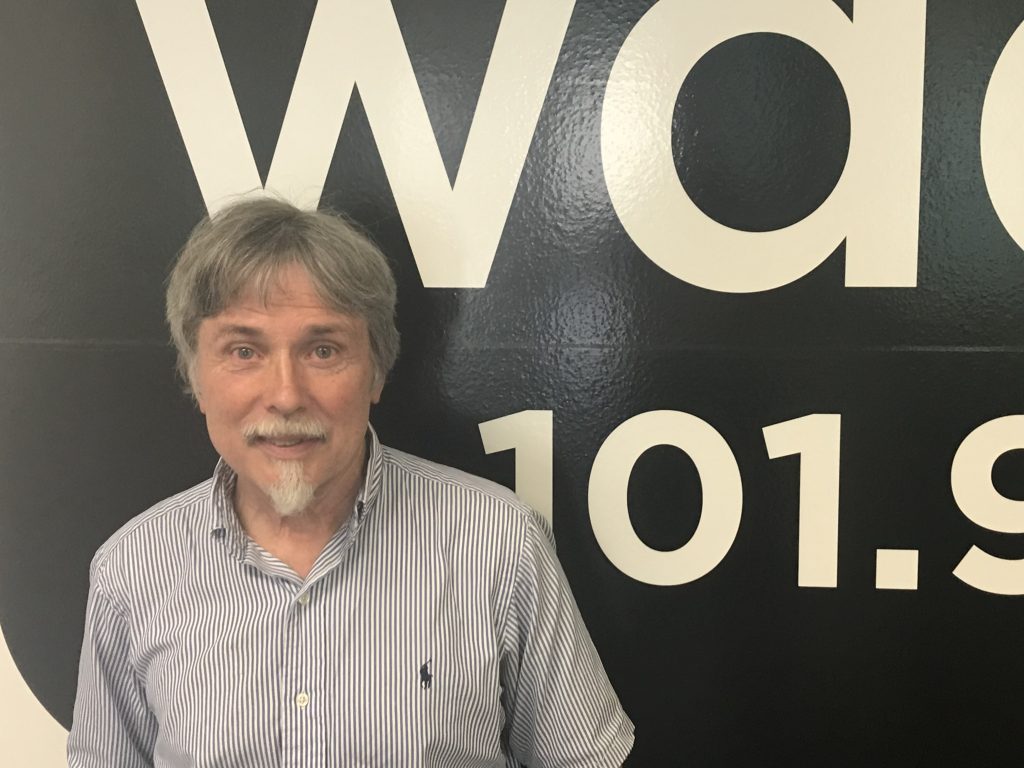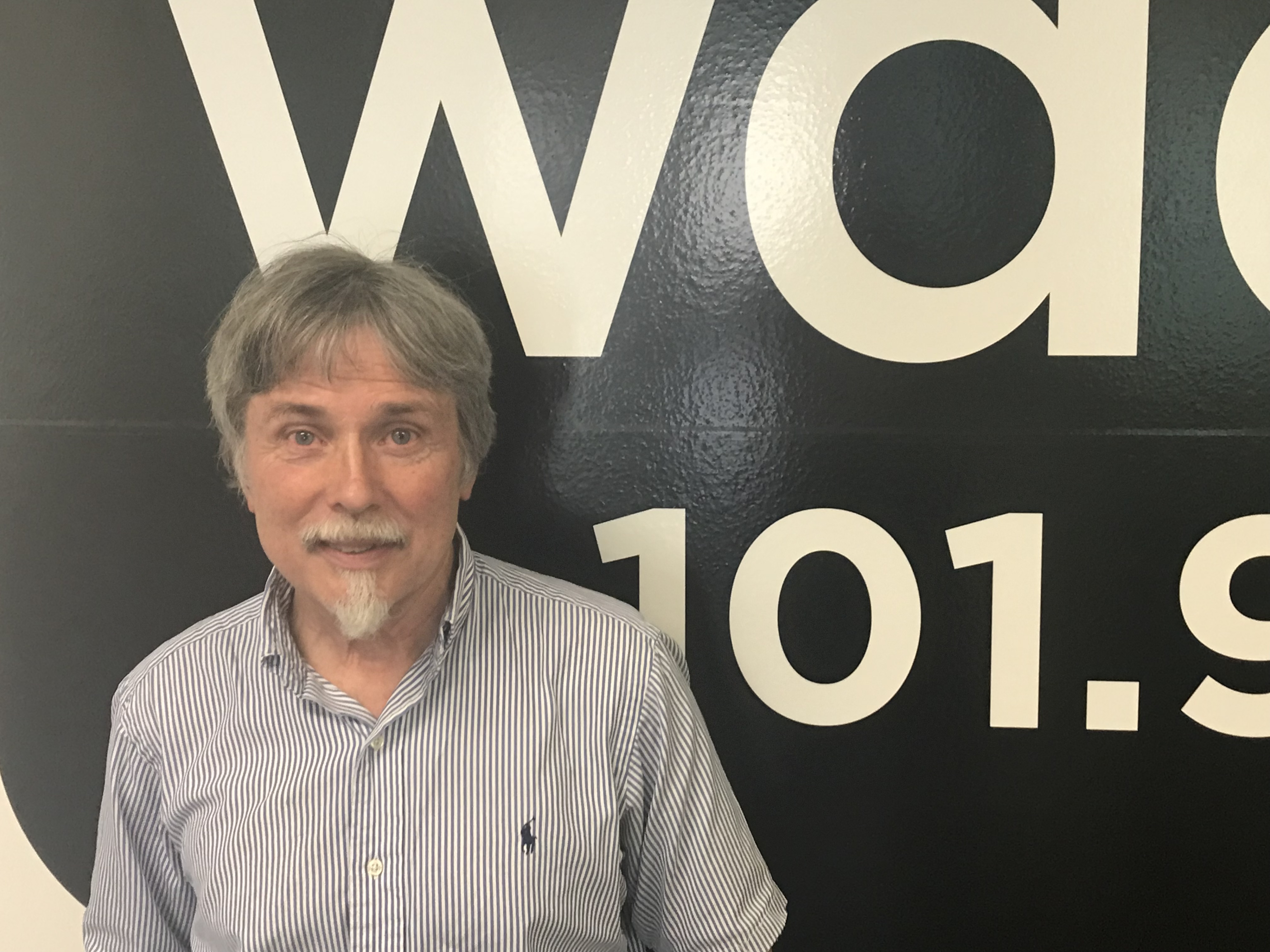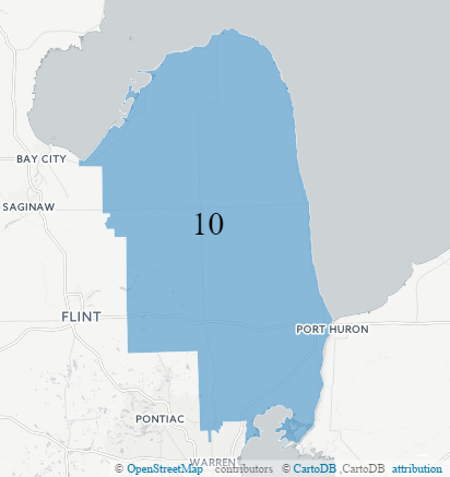Prepare to Vote: Candidate Michael McCarthy [AUDIO, TRANSCRIPT]
Meet one of the Democrats running in 10th Congressional District primary.

On Aug. 7, 2018, voters in Michigan’s 10th Congressional District will choose a Democratic nominee to run against Republican incumbent Rep. Paul Mitchell in November. WDET’s Pat Batcheller interviewed the three candidates who are on the Democratic primary ballot. Click on the audio player to hear the conversation and read a transcript below.
Michael McCarthy
Age: 71
Elected experience: None. Worked on Eugene McCarthy’s presidential campaign in 1968.
Other experience: Retired physician’s assistant, writer, volunteer (Peace Corps, AmeriCorps, Habitat for Humanity)
Education: Michigan State University
Campaign website: Michael McCarthy for U.S. Congress
Facebook: Michael McCarthy for U.S. Congress

Why are you running?
Michael McCarthy: I’m really worried at this point that democracy is in demise, and that we need to step up and do something about it. That’s why I’m running.
What’s one thing you would do to heal it?
Michael McCarthy: Well, the first thing is to get rid of all voter suppression. I think there’s a virus of voter suppression out there. To cure it, we need to get the Voting Rights Act back. We need to have adequate election booths and facilities available on the day of the election. There is a ballot measure right now called “Promote the Vote” which has various elements that I totally support. Since I’ve been of age to get one, I’ve always gotten an absentee ballot. Election Day should be a holiday. We should really have total voter encouragement. If we continue to try to make people marginalized outside of being informed and outside of being able to consider properly their decisions in our democracy, then we’re basically going to be left without a living democracy.
How do you beat an incumbent who won by such a large margin?
Michael McCarthy: Well, basically my idea is to have a very positive campaign in a very negative political environment. What I’m hoping to achieve comes a lot, too, from my being the father of four adult children who have gone through the university system. They’re all quite accomplished, clever and compassionate people. They all got out with huge debts. Because they were fortunate enough to find good jobs, they are the lucky ones. But many, many are getting out of college and not then receiving the right or proper work opportunity. I’ve been a member of a union. I’ve worked with farm workers myself, both and as organizer and when I was going to college, I actually worked during the summers with farmers and farmworkers, and lived in the farm labor camps with the Mexican-American laborers in the Thumb. That experience has changed my life. I want every young person to do universal service. I’d want them then to be given a G.I. Bill-type backing so they didn’t get out of college or trade school with a mortgage-sized debt around their neck before they’ve even got their first paycheck. I think that that kind of faith gets re-established when you’re out there living and helping in supported volunteerism like AmeriCorps, Peace Corps, the military is already there. But I would like those other opportunities to become part of universal service. You serve and then you…maybe you’ve worked out in the northwest doing forestry. Maybe you’ve worked down in New Orleans doing disaster relief. Maybe you work in the southwestern migrant clinics like I did. Doing what you can, even though you don’t have your full skill level. Then you’re more acquainted with what your talents are and what you’d like to do with the rest of your education. So that sometime after high school, maybe mid-college, maybe after college, you’re doing these things, and also in other parts of the world. President Kennedy and Sargent Shriver designed the Peace Corps to be 100,000 members. And within the first couple of years, since 1961, they got up to 4,000 to 7,000. In the 50 years since, it has never been more than that. It would take time to make a good Peace Corps/AmeriCorps program really viable, and out there doing the kind of things I that I think really would make for [better] homeland security. We need connectedness, not walls.
You’re one of three Democrats that are on the ballot. What makes you the best of the three, and do you feel that you are progressive enough to win the nomination?
Michael McCarthy: I believe I’m the most progressive of all three to be working on these projects I’ve just outlined. The positive projects of universal service and of debt reduction for education. You need to have money and I believe that that money needs to come from, interestingly enough, fulfilling what President Trump began in December of 2017. He the first-ever audit of the Pentagon. I believe that there’s too much money being spent on superfluous weapons systems. Not enough ever trickles down to the average soldier. Those who are in combat end up with PTSD or health problems that the V.A. or other systems have not been well adept at helping to solve. I want to look at reconverting those extra monies for things like an F-35 Striker Jet program. People who fly the planes have said they aren’t very confident of their capabilities. The $100 billion restructuring and renovation of the nuclear weapons system, while we’re trying to get Iran or Iraq to not build one. We ourselves are having 5,000-plus, and making them totally new and more lethal than ever. That’s not the message that we want to give to the rest of the world and we could be doing so much better with those funds, in terms of education, in terms of green energy. We’re a clever people. We could do more with mass transportation. We in the Detroit area have been very much the engine of the automobile in transportation. We can do better with government support. Mass transit, in particular, does not have to be in competition, it can be the real link that maybe makes for less pollution from individual vehicles. We need to consider those kind of things. Family farms up in the Thumb area, they need help. They don’t need these new tariffs that are going to really hurt corn growers and soybean growers up in that area. We need to be conscious of the needs for good jobs and we need to be facilitating better unions. Real solidarity of unions is what built this country, and particularly this area.
Some Democrats have made opposing President Trump a major campaign theme. Is being anti-Trump enough to win? Do democrats need a message that’s more substantial?
Michael McCarthy: Definitely. I think that we really need to stand for who we are. Those ideas about union solidarity. If you get people who are really connected, the fights between labor and an employer. If you get a union which is really functioning well and people are aiding each other in the performance of their jobs, then that has to be better for the employer as well. We need that kind of reaching across aisles. Yes, there are definite differences but we must respect each other. We are a country that has a history that does include some very big problems. The racism and the rich vs. poor situations are always things that we could fall back into a worse situation. When I go to Washington, I would be very interested in establishing stronger relationships with the people that do public service. At least start off with the idea that I’m going to make my country and this world better. We need to be working on that and spending time sharing our efforts. Sometimes we’ll disagree, but agreement is the kind of thing that’s been missing from our national conversation.

WDET listeners have identified four issues that matter most to them. Those issues include water, transportation, education, and gerrymandering. Let’s take each one separately. How would you improve our water if elected to Congress?
Michael McCarthy: We need to continue with the EPA as a servant of the people. We need to have their kind of regulation and involvement. We need to take seriously the local problems that we find with Flint and the infrastructure which has not been well-supported. I think that national legislation can help new investment in that infrastructure, replacement of the lead pipes that have been the problem in Flint. We’re finding that there are lead problems in Port Huron that are both airborne and perhaps waterborne as well. We haven’t been taking a good enough look at that. Supporting universal service and debt restructuring. And we have been really overspending on military. The war on terror doesn’t seem to have gotten us anyplace. The water issue could be solved if we had new investment from that kind of place. We need to make decisions nationally on where we want to put our money and our time. So there are many things that could be done for the water and those kind of issues need resources.
How would you improve transportation?
Michael McCarthy: The roads situation is very bad. Just coming down here from Port Huron on I-94, there’s always construction going on. The idea of the materials necessary and the technology necessary to build good roads is something that, nationally, I think the Department of Transportation could do a better job of. I also think that we have the highest maximum load limit, I think, in the country. And if you continue to put the PSI—the pounds per square inch—on each tire on a huge level on our roads with the big, big trucks that we have, you’re going to make the roads worse. We should have national legislation that limited that to a certain reasonable limit supported by research, and by people who know the whole structure of road’s problems. Because if you have less weight on each truck, you must have more loads be scheduled. Basically, more trips and that’s better for the workers in the trucking industry. Everybody could readjust to that, but if you keep pounding them, you’re going to keep having to repair them.
Pat – How would you improve schools?
Michael McCarthy: I’m the product of 13 years of parochial education, and that was wonderful. My parents and other people helped that happen. But the public education system has to be the bedrock. It has to be well-funded. I think teachers—public teachers and those in the private sphere—should all be paid about as well as we pay any of our professionals. I think we need to reinvest in education. Once again, it’s a question of priorities. Do we pay for more sophisticated weaponry systems internationally, or do we start looking to the real needs of our children? I would want to limit the privatization of public education. I think that the charter schools need to be much better regulated and we need to start with public education as the fundamental way that we educate all of our people to be critical thinkers and to be able to make our democracy strong.
Do you think gerrymandering is a problem, and if you do, how would you fix it?
Michael McCarthy: Well, I come from a gerrymandered district. David Bonior was for many, many years, our representative up there. And when he retired, there was a redistricting, and since that time, Republicans have basically controlled that seat. First with Candace Miller and now, Paul Mitchell. So gerrymandering is a real problem. Gerrymandering has already been given a solution—an anti-gerrymandering measure which basically gets parties out of it and put it into a group of public figures that knew the situation but weren’t connected to parties. So that is the solution people will be able to vote on in the general election, and I’m glad for that.
Anything we haven’t talked about that you would like to say?
Michael McCarthy: I’m really running because of this problem in our democracy of people being left out. I’ve mentioned the problems of racism. For me, it was a big boost in the other direction to be—coming from an area in Jackson, Michigan that was all white—to be involved with migrant workers and then having many African-American friends through the years. We need this kind of interconnectedness in America. We need to be doing things for the immigrants who are worried about the path to citizenship for DACA. We need to be open-minded and we need to be welcoming. We are a nation of immigrants. Almost all of us have come from some other shore. We’ve made a great country, but to have an interconnectedness with people from not just Latin America, but China, Russia, all the different areas of the world. We need to start reconnecting to them because we are basically the melting pot people. All of us have some relationship—mine with Ireland, many people with different places. We need to rekindle that respect. And one of the ways to do it is to spend a year or two working alongside people of those other cultures. And by so doing, their fear of us and our fear of them is diminished. And fear is really the root cause of war. And we are a faithful people. We are a clever people. And we can’t just be sending our young people out there coated with Kevlar, burdened down with military hardware. Bombs and bullets are never going to solve our problem. We need to reinvest in our democracy. We need to reinvest in our own people and the strength that we have from all the places that we’ve come from.
